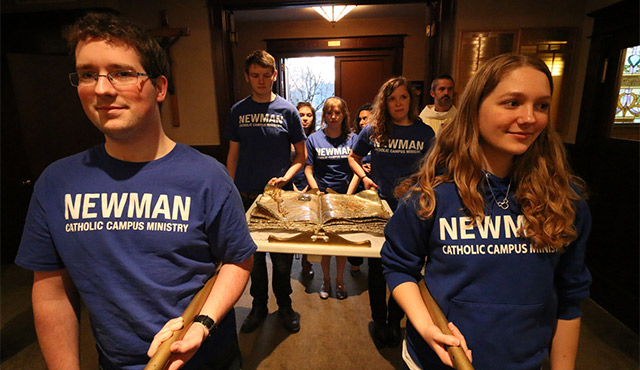It’s that time of the year: After years of hard work, high school seniors are hearing whether they were accepted to the colleges of their choice. Each year, I help families navigate the sometimes-murky process of making the best college decision. Even the most committed Catholic parents can get caught up in “bragging rights,” choosing prestige over the optimal culture and climate for their child. Despite raising children with Catholic traditions and values, parents may not have thought about the “hidden” factors to consider when helping their child to choose the right college—one that won’t undo years of good Catholic parenting. I’d like to share those factors with you, and explain why I believe the final decision is a family decision, not one that should be left entirely to an 18-year-old.
As parents, we walk a fine line between letting go and continuing to influence our children when they head off to college. One way to help ensure that Catholic values infuse their college experience is to send them to a Catholic college. On the Cardinal Newman Society website, the Most Rev. William E. Lori, Archbishop of Baltimore writes, “(I)n a faithful, high-quality Catholic college, you will consider the ethical implications of our Faith and the intersection of faith and reason in all of your courses.” I’d like to believe that environment would appeal to Catholic high school graduates. Yet my research suggests that only about 15% of graduates from Orange County Catholic high schools choose Catholic colleges. It saddens me that many who are accepted to these fine institutions choose to go elsewhere. If you’d like to encourage your child to attend a Catholic college, or at least to engage in Catholic life during college, here are my suggestions.
College Visits
Spend plenty of time researching and visiting both Catholic and non-Catholic colleges. Some Catholic colleges have “party school” reputations, but that doesn’t mean your child can’t find a rich and meaningful Catholic experience there. Meanwhile, some non-religious colleges have vibrant Catholic communities on campus; as a mentor at USC’s Caruso Catholic Center, I’ve seen this first-hand. Check out the list of 50 best college Newman Centers at www.bestcollegereviews.org/features/college-newman-centers/ . At Catholic colleges, the extent to which Catholic doctrine is infused into the curriculum can vary widely. Investigate this, considering both theology and philosophy. Check the College Planning Guide on the website of the Cardinal Newman Society, cardinalnewmansociety.org . Consider the speakers who come to campus, the clubs offered, and other aspects of college life. When you visit colleges that are not Catholic, visit their on-campus Newman Center, attend a campus mass, or go to the local parish.
Start a Dialogue
Almost all students’ values are challenged at some point during college, no matter where they go. Talk to your child about where they will turn when that happens. What support systems are in place? Throughout their lives, your children have been able to turn to their faith and their priest. Assure them that they can seek out that same support on their college campus.
Talk to your child about his or her goals—not just career goals but personal ones. College is not only a place to prepare for a job, but also to make lifelong friends and possibly meet your spouse, ascertain your role in the world, and, hopefully, solidify your faith and relationship with God.
If your child begins to question their faith and rebel, stand by them. My own son declared himself an atheist while attending Catholic high school, but returned to his faith while a student at USC. He in fact whispered to me in church on Mother’s Day that year that his gift to me was that he believed in God again. Had I alienated my son, I may never have known that precious gift.
Talk to other students
Other students who currently attend Catholic college may have the greatest influence on your child. Have them speak with alumni from their high school who have had a positive experience at a Catholic college—students like Ben Cooper, a 2012 graduate of Mater Dei, who is a senior at Boston College. “Catholic universities do a great job at creating a sense of community,” Cooper said, “so there definitely was an immediate comfort factor once I arrived on campus.”
“When I want to attend Mass or I want to speak to a priest or I want to get involved in community service, a Catholic university provides all of that and more,” he added. “I’ve met tons of people of various religions while at a Catholic university. However, the traditions, values and community of a Catholic education are very strong.”
Other benefits to Catholic colleges
The numerous other benefits to Catholic colleges include:
- Outstanding academic reputation
- Alumni networking
- Low cost of attendance compared with most private universities
- Healthy endowments, excellent facilities, and top-notch professors
- Emphasis on a life of service, during college and beyond
No matter where your child ultimately goes, keep attending Mass together and observing your faith in the ways that have provided comfort and security over the years. Various studies show that students of all faiths tend to become more secular during college. However, a 2010 Georgetown University study concluded there was no significant secularizing trend among Catholic students attending Catholic colleges. To me, this is all the more reason to encourage your children to choose such a college. Guide them, lead by example, and of course, pray.
Karen Curreri is President of Curreri Educational Consulting in Corona del Mar and holds a master’s in counseling from Johns Hopkins University. Her 27 years working with students includes counseling positions in Catholic K-8 and high schools.

